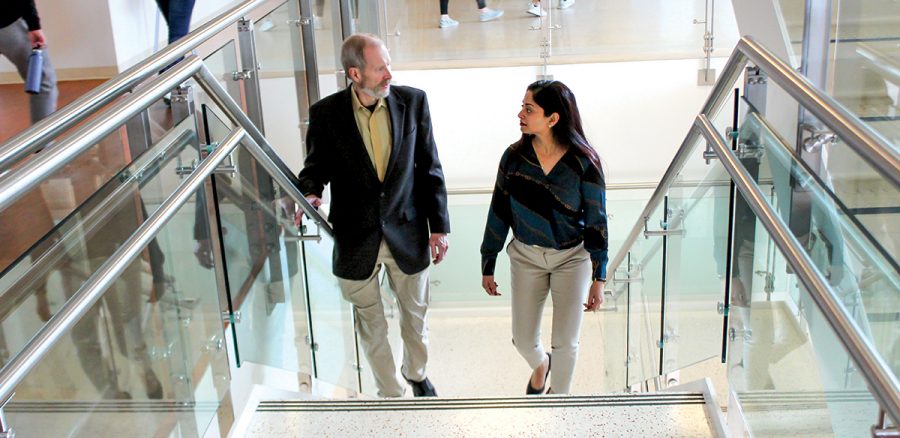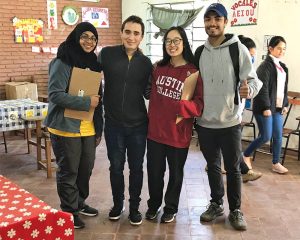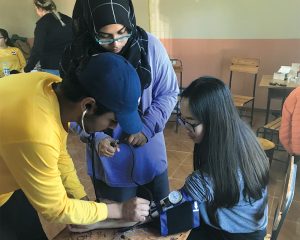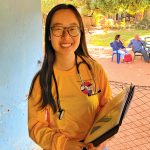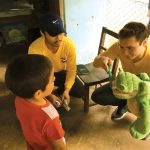Less than five years after Public Health was added to the
Austin College curriculum, it is one of the top five majors among graduates.
“This program answered a big unmet need in our curriculum,” explained Dr. George Diggs, Professor Emeritus of Biology, who has delayed full retirement to serve as co-director of the Public Health Program.
The arrival of his co-director, Epidemiologist Dr. Saritha Bangara, was a big step toward meeting that need. She came to Austin College in 2015 in a visiting role and became a tenure-track faculty member in 2016. Dr. Mathias Akuoko, whose specialty is Health Policy and Management, also began as a visiting faculty member in 2016 and became tenure-track in 2018. This spring, Physician-in-Residence Dr. Joyce Mauk, a retired physician who will teach Public Health Advocacy, joins the two full-time faculty and Diggs, who, with a specialty in Environmental Health, continues in a part-time teaching role. For fall 2020, the program plans to add a faculty member specializing in Social and Behavioral Health.
T he science of Public Health focuses on preventing or stopping the spread of illness and disease at the population level, while medical health professionals focus mainly on treating sickness and disease at an individual level. Public Health also works to limit health disparities.
he science of Public Health focuses on preventing or stopping the spread of illness and disease at the population level, while medical health professionals focus mainly on treating sickness and disease at an individual level. Public Health also works to limit health disparities.
Austin College’s Public Health Program focuses on varied approaches to preventing disease, promoting health, and prolonging life. Courses provide a broad understanding of the field but also allow students to focus on particular aspects of public health they are most interested in, from the business and management side of public health to the scientific, policy, social, cultural, or clinical aspects.
“We are pleased to offer Public Health for students coming here with interest in the field, and many students planning to complete medical school are also interested in Public Health, as considerable overlap exists in the fields,” Bangara said. “Public Health is sometimes viewed as a fallback option for students who find they are not cut out for medical school, but they soon realize it is not an ‘easy’ option. From ‘Fundamentals of Public Health’ to ‘Epidemiology’ to ‘Biostatistics’ and more, these are dense and intense courses.”
In most cases a master’s degree in Public Health is needed to open career doors, Bangara said. Austin College has Gateway agreements with Boston School of Public Health, Texas Tech, UT Tyler, and UT Dallas that allow qualified students to apply during their junior year without taking standardized tests. Students, of course, can apply to any Public Health program but these institutions currently have special Gateway agreements with the College.
Learning opportunities beyond the classroom provide further exploration of the field, like the JanTerm exploration of healthcare in Ghana led by Akuoko. Research is another option, and 2018 graduate Ashley Chen ’18, who earned Honors in Public Health at graduation, traveled with Bangara in November 2019 to present research findings at the American Public Health Association in Philadelphia. Chen is an M.D./Master of Public Health student at UT Medical Branch at Galveston.

- Nearly half of all Americans suffer with at least one of these sinister chronic diseases.
- These diseases are responsible for more than two-thirds of all deaths in the U.S.
- These diseases will continue to rampage unless lifestyle changes are made regarding tobacco use, poor nutrition, and lack of physical activity.
- One hundred years ago, the majority of America’s “top killers” were infectious diseases—pneumonia and flu, tuberculosis, diphtheria, and gastrointestinal infections.
- Medical discoveries like antibiotics, vaccinations, viral isolation, and serologic testing, along with public health education about sanitation, hygiene in food preparation, and medical care, have wiped out several infectious diseases in the U.S.

Interns Mahaa Siddiqui, Abiel Cardenas-Botello, Holly He, and Zain Kazmi
interacted with several groups during their Paraguay experience.
Another opportunity, a summer Comparative Public Health Internship, pairs students with Grayson County United Way agencies for one month; students then travel to Paraguay for a two-week service learning experience with the organization OutreachPARAGUAY. The nonprofit operates each summer in collaboration with Paraguayan community leaders, educators, and health care professionals to get needed materials and services to resource-poor areas of Paraguay. The organization also seeks to develop mutual respect and friendship between the people of Paraguay and the United States.
In summer 2019, four Austin College students completed the internship and encountered several new perspectives as they interacted with the local agencies that address addiction, homelessness, mental health, and more. The trip to Paraguay brought further revelations as they encountered scarcity of resources, rural health limitations, cultural differences, and sometimes limited access to health care.
The interns and their hosts were part of a Mobile Health Clinic team providing diabetes and hypertension screening and education, as well as dental hygiene education, to elementary-aged children. The student interaction with the local community is especially important for Outreach Paraguay director and co-founder Eileen Sosa. “We want students to understand and recognize the impact of psychosocial, environmental, political, and cultural context on the health of an individual and a community,” she said. “We strongly believe that it is by sitting at the same table, sharing a meal, and sharing stories that we learn with and from one another.”
She said the Austin College students took every opportunity to pitch in to help and to learn from their hosts. “It is our hope that everyone that travels with us to Paraguay has been changed in some way by what they have seen and experienced, and by what they learned from the Paraguayan people,” Eileen said. “We want them to return home better citizens, committed to efforts aimed at reducing health disparities, both locally and globally.”
Back on campus for the 2019 fall semester, the interns presented their experiences and expressed their desires to do just that, no matter what directions their careers may take them.
 Eileen Sosa is a former Peace Corps volunteer to Paraguay who founded OutreachPARAGUAY with her husband, Milner Sosa, who was born in Paraguay. When not in Paraguay, they are in Pennsylvania, where Eileen is a Family Nurse Practitioner and Milner teaches Spanish and coaches soccer in middle school and high school. They and their three sons are familiar with Austin College; Eileen’s brother is President Steven O’Day.
Eileen Sosa is a former Peace Corps volunteer to Paraguay who founded OutreachPARAGUAY with her husband, Milner Sosa, who was born in Paraguay. When not in Paraguay, they are in Pennsylvania, where Eileen is a Family Nurse Practitioner and Milner teaches Spanish and coaches soccer in middle school and high school. They and their three sons are familiar with Austin College; Eileen’s brother is President Steven O’Day.

